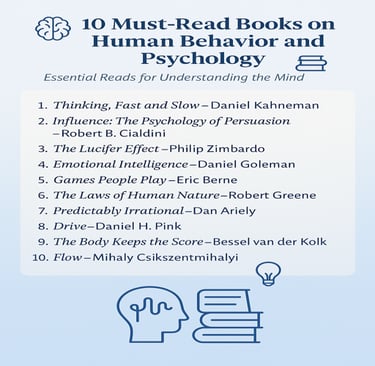10 Psychology Books to Ignite Your Mind’s Fire
BEST BOOKS
Chaifry
5/15/20253 min read
The human mind, a kaleidoscope of instinct, reason, and emotion, captivates scholars and seekers alike. This review explores 10 seminal works that illuminate the intricacies of human psychology, from cognitive biases to persuasive tactics and the roots of motivation. Spanning Thinking, Fast and Slow to Flow, these books weave science and storytelling into profound insights. While their brilliance lies in accessibility and depth, their occasional complexity or narrow focus may challenge some readers. This review argues that these works transform our understanding of the psyche, demanding curiosity and engagement.


Thinking, Fast and Slow – Daniel Kahneman
Thinking, Fast and Slow is a captivating exploration of Kahneman’s groundbreaking research on decision-making. In it, Kahneman unveils two modes of thought: System 1, impulsive, automatic, and intuitive, operates without conscious effort, while System 2, deliberate and analytical, requires focus. The book examines how their interplay shapes our judgments and actions. Kahneman crafts an engaging synthesis of cognitive psychology, challenging readers to rethink how biases, like anchoring, influence their decisions.Influence: The Psychology of Persuasion – Robert B. Cialdini
Influence is a riveting exposé of Cialdini’s research on persuasion’s mechanics. Cialdini identifies six principles—reciprocity, commitment, social proof, authority, liking, scarcity—that drive compliance. The book reveals how these tactics, like offering free samples to trigger reciprocity, shape behavior. Cialdini’s accessible narrative blends vivid examples with psychological insights, compelling readers to recognize and navigate the subtle forces of influence in everyday life.The Lucifer Effect: Understanding How Good People Turn Evil – Philip Zimbardo
The Lucifer Effect is a haunting account of Zimbardo’s exploration into situational evil. Zimbardo investigates how context, exemplified by the Stanford Prison Experiment, can corrupt moral individuals. The book shows how roles, authority, and group dynamics override personal ethics. Zimbardo’s gripping narrative unveils the power of situations, urging readers to question how environment shapes their moral choices.Emotional Intelligence: Why It Can Matter More Than IQ – Daniel Goleman
Emotional Intelligence is an insightful journey into Goleman’s research on emotional aptitude. Goleman argues that self-awareness, empathy, and emotional regulation—components of emotional intelligence—outweigh cognitive intelligence in personal success. The book illustrates how these skills enhance relationships and leadership. Goleman’s compelling prose invites readers to cultivate emotional mastery, redefining intelligence in human interactions.Games People Play: The Psychology of Human Relationships – Eric Berne
Games People Play is a witty dissection of Berne’s work on social dynamics. Berne introduces transactional analysis, revealing psychological “games” like “Why Don’t You—Yes But” that underpin interactions. The book explores how these unconscious scripts shape relationships. Berne’s engaging style offers a lens to decode social behavior, prompting readers to reflect on their own interpersonal patterns.The Laws of Human Nature – Robert Greene
The Laws of Human Nature is a sweeping exploration of Greene’s insights into human motivations. Greene examines drives like narcissism and envy, offering strategies to navigate them. The book blends historical anecdotes with psychological principles to reveal behavior’s roots. Greene’s vivid storytelling compels readers to master social dynamics by understanding the forces shaping human nature.Predictably Irrational: The Hidden Forces That Shape Our Decisions – Dan Ariely
Predictably Irrational is a lively probe into Ariely’s research on decision-making flaws. Ariely reveals how systematic biases, like overvaluing free items, lead to irrational choices. The book illustrates how these patterns govern behavior. Ariely’s playful narrative, grounded in experiments, challenges readers to recognize their own irrational tendencies and rethink decision-making.Drive: The Surprising Truth About What Motivates Us – Daniel H. Pink
Drive is an inspiring exploration of Pink’s research on motivation. Pink argues that intrinsic motivators—autonomy, mastery, purpose—surpass extrinsic rewards like money. The book shows how these drivers fuel engagement and creativity. Pink’s dynamic narrative encourages readers to seek purpose-driven motivation, reshaping their approach to work and personal growth.The Body Keeps the Score: Brain, Mind, and Body in the Healing of Trauma – Bessel van der Kolk
The Body Keeps the Score is a profound examination of van der Kolk’s work on trauma. Van der Kolk reveals how trauma embeds in body and mind, advocating somatic therapies like yoga for healing. The book connects physical and psychological recovery. Van der Kolk’s empathetic narrative inspires readers to understand trauma’s impact and pathways to healing.Flow: The Psychology of Optimal Experience – Mihaly Csikszentmihalyi
Flow is an uplifting exploration of Csikszentmihalyi’s research on optimal experience. Csikszentmihalyi describes “flow” as a state of immersive focus and fulfillment, driven by challenge and skill balance. The book illustrates how flow enhances life’s joy. Csikszentmihalyi’s evocative prose invites readers to pursue activities that spark deep engagement and meaning.
